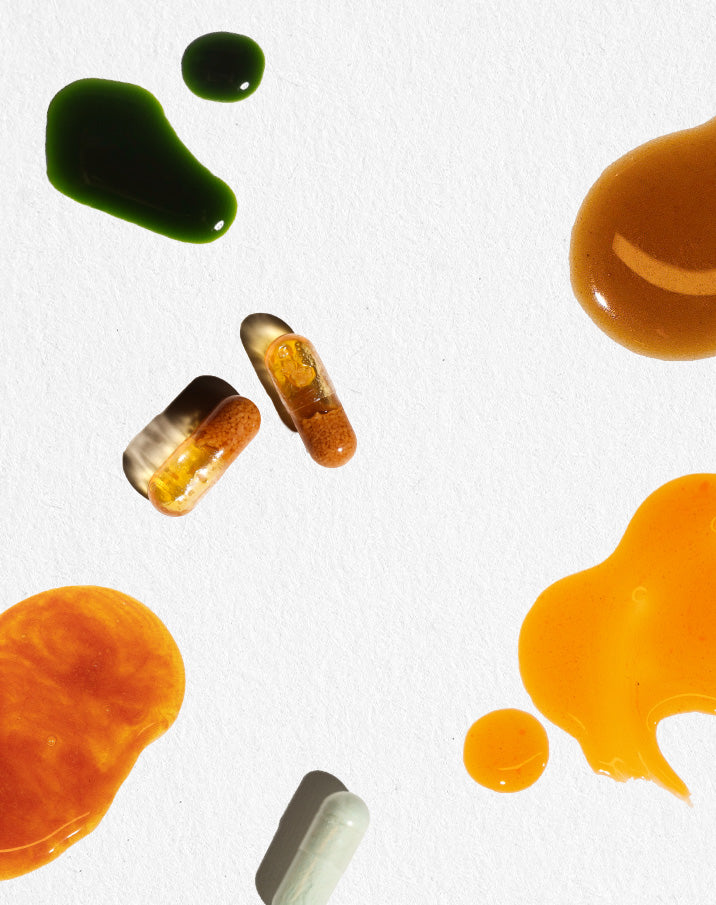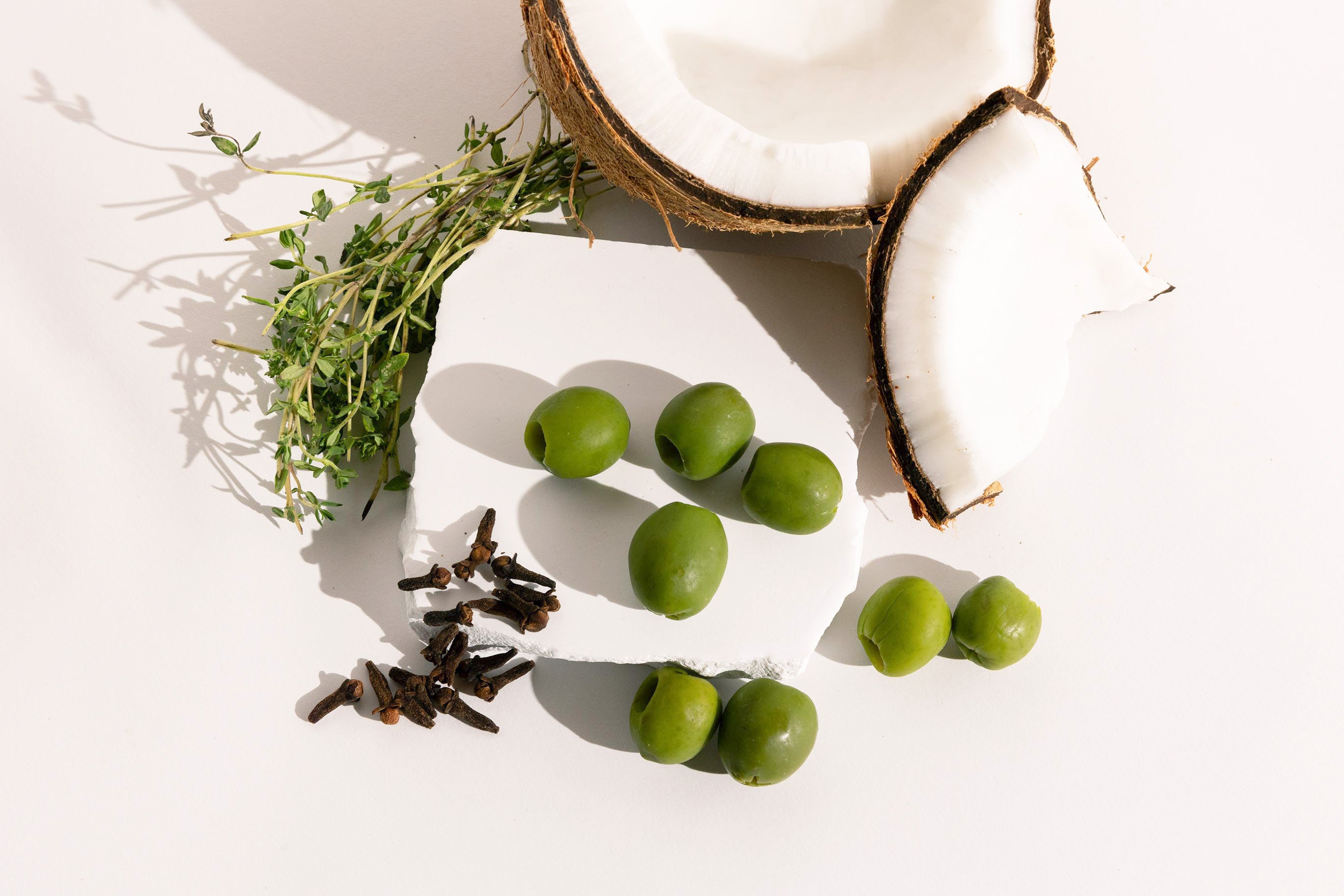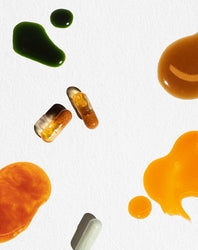
Glutathione is a powerful antioxidant that’s known as a tripeptide.1 Tripeptides are formed when three amino acids combine to create a single molecule. In the case of glutathione, those amino acids are cysteine, glycine, and glutamine (also known as glutamic acid).
foods with glutathionegredients in anti-aging supplements.The human body produces glutathione naturally in the liver and at very high levels throughout most of its cells. That said, it plays a direct role in some of the body’s most important processes, from neutralizing free radicals and regenerating vitamins C and E to governing several liver reactions and mitochondrial functions. That’s why we recommend incorporating in your daily diet.
Glutathione is also available as a supplement, and it's widely believed to elicit a range of health benefits, from improving the condition of your skin to boosting the health of your cells, nerves, and organs. In this article, we’ll cover eight potential benefits of glutathione supplements and how to use them.
#1 May Promote Cell Health
Studies show that glutathione may help keep cells healthy.2 Largely, this is thanks to its master antioxidant properties, which make it excellent at reducing cell damage and stress associated with free radicals.
Free radicals are atoms or molecules that carry an odd or unpaired number of electrons. There are good and bad free radicals.3 The body produces the good kind and uses them to protect cells and kill bacteria, among other things.
However, bad free radicals come from external sources, such as:
- Air pollution
- Cigarette smoke
- Medications
- Radiation exposure
These free radicals wreak havoc on cells, causing a type of damage known as oxidative stress. Essentially, this refers to low levels of antioxidants in the body, a condition linked to various serious and even life-threatening medical conditions.
Fortunately, studies also suggest that glutathione could help boost antioxidant levels in blood cells, which may help reduce the harm caused by free radicals.
#2 May Promote Skin Health
Some evidence suggests that glutathione may support skin health and reduce symptoms of common skin conditions, such as psoriasis.
Another study suggests that glutathione has the potential to combat and in some cases reverse age-related skin damage, including discoloration, age spots, and wrinkles.4 For this reason, glutathione is one of the most common ingredients in anti-aging supplements.
#3 May Promote Liver Health
Some studies suggest that glutathione plays an important role in the health of our livers. The liver is among the body’s most important organs. Among its several vital responsibilities, it plays a key role in:5
- Cleaning blood by purging toxins
- Digestion and metabolism
- Energy and nutrient storage
That said, the liver relies on antioxidants to stay healthy and function properly. Without an adequate amount of antioxidants, the organ can experience cell damage and death. This leads to a condition known as fatty liver disease, which refers to extra fat storage in the liver.6
Although fatty liver disease is fairly common, it can lead to more serious liver damage.
Fortunately, in studies, glutathione has been connected to an increase in antioxidant activity in liver cells,7 which may help reduce the symptoms of acute poisoning and chronic liver diseases.8
#4 May Promote Blood Sugar Management
There’s a chance that glutathione supplements can help regulate blood sugar levels, especially in older adults.9 It’s also possible that glutathione may help reduce damage from conditions associated with elevated blood sugar levels.10
There are two primary ways that glutathione can impact blood sugar levels:
#5 May Improve Circulation
The results of at least one study strongly suggest that improved blood circulation may be among the top benefits of glutathione.
The study involved 40 participants with peripheral artery disease (PAD), a condition that’s characterized by constricted or blocked blood vessels, usually in the legs.11 PAD can increase your risk of serious medical conditions, including:
- Heart attack
- Stroke
- Stenosis
But it appears that glutathione may be effective for managing PAD and some of its associated symptoms, such as impaired circulation and decreased mobility.12 In fact, participants who received twice-daily doses of glutathione experienced improved macrocirculation and microcirculation after only five days.
#6 May Promote Nerve Health
There are numerous studies that indicate a connection between glutathione and the nervous system. For example, a study conducted at the University of South Florida suggested that intravenous glutathione treatments could help improve neuromodulation in people with compromised nervous systems, especially concerning motor control and movement.13
Those findings are echoed in a 2021 review of more than 900 studies, which strengthens the claim that the benefits of glutathione could extend to the central nervous system and help improve mobility and curb involuntary movements or tremors in people with impaired nervous systems.14
#7 May Be Able To Boost Your Immune System
Vitamin C isn't the only nutrient that can help boost your immune system. As a powerful antioxidant, there’s a good chance that glutathione could positively impact your immune system by relieving oxidative stress.
There are several autoimmune disorders that can complicate the body’s immune response. Frequently, these disorders are characterized by chronic inflammatory conditions that affect various parts of the body, including:
- Joints
- Digestive system
- Skin
- Brain
Although inflammation is a natural and healthy immune response in most acute situations, when it becomes chronic, it can damage cells and increase oxidative stress.15 That’s where glutathione comes in. According to one study, glutathione may help by getting rid of free radicals and soothing oxidative damage.16
#8 May Promote Respiratory Health
Glutathione may also support the respiratory system, the complex network of lungs, airways, and blood vessels that allow your body to:17
- Ingest oxygen
- Distribute oxygen to organs, tissues, and muscles
- Expel carbon monoxide17
The respiratory system is susceptible to many conditions that can impair breathing and oxygen circulation.
That said, N-acetyl-cysteine, a by-product of glutathione, has been found to reduce mucus in the airways in the case of lung conditions like chronic obstructive pulmonary disease (COPD).18 As such, it’s believed that glutathione can improve respiratory function, particularly in those with compromised respiratory systems.
Glutathione Supplements 101
Increasing glutathione levels has its benefits when consumed moderately. However, before you add a supplement to your wellness regime, you should always consult with your healthcare provider to ensure that it’s a safe option for you and your family.
Types of supplements
As a supplement, glutathione is available in several forms. That means that the first step is to determine which form is right for you. Currently, glutathione is available in:
- Oral forms
- Supplements, such as our Liposomal Glutathione, which is easily absorbed by the body
- Inhalants
- Topicals, such as lotions, salves, and creams
- Intravenous injections
When choosing a glutathione supplement, it’s critical to factor in any underlying medical conditions and your health goals into your decision.
Dosage
Available research provides us with general guidelines for ingesting glutathione. According to some studies, a daily dose of 250mg was determined to be both safe and effective at dispensing some of the potential health benefits of glutathione, such as improved skin quality.4
Other studies have correlated proper dosages with individual body weight, age, and medical history, and they suggest that dosing should occur twice daily.19 It’s also believed that the best time to take glutathione is in the evening before bed—about two to three hours after dinner.
Aging and Glutathione Levels
As you age, glutathione production decreases. To prevent glutathione deficiency, you can opt for natural ways of increasing glutathione levels with natural supplements. The possible consequences of low glutathione levels include seizures, coordination loss, and intellectual disability.
But you don't have to resort to extreme measures, such as glutathione injections or glutathione synthesis, to prevent low glutathione levels. Some simple methods include eating glutathione-rich foods like legumes and citrus fruits.
Supplement Your Health With Cymbiotika
Glutathione is believed to be critical to numerous body functions and may support cell, skin, liver, circulatory, respiratory, and immune health.
With such wide-ranging effects and potential benefits, glutathione is integral to your overall health and wellness. When taken in liposomal form, glutathione aids cellular energy production, cognitive and immune function & detoxification. Ultimately, taking glutathione in the liposomal form is ideal because it’s easy for the body to absorb. If you’re concerned about your levels, you may wonder whether introducing supplements into your daily routine is the right choice.
At Cymbiotika, we’re specialists in vitamins and supplements that nourish your body and promote wellness. In combination with healthy eating, our daily glutathione supplements can help support your gut health, boost your metabolism, and fight the signs of aging.
Experience glutathione health benefits and boost your health with Cymbiotika.
Sources:
- PubMed Central. Glutathione! https://www.ncbi.nlm.nih.gov/pmc/articles/PMC4684116/
- PubMedCentral. Role of Glutathione in Cancer Progression and Chemoresistance. https://www.ncbi.nlm.nih.gov/pmc/articles/PMC3673338/
- PubMed Central. Free Radicals, Antioxidants in Disease and Health. https://www.ncbi.nlm.nih.gov/pmc/articles/PMC3614697/
- PubMed Central. Glutathione and its antiaging and antimelanogenic effect. https://www.ncbi.nlm.nih.gov/pmc/articles/PMC5413479/
- Cleveland Clinic. What It Does, Disorders & Symptoms, Staying Healthy. https://my.clevelandclinic.org/health/articles/21481-liver
- Cleveland Clinic. Fatty Liver Disease : Risk Factors, Symptoms, Types & Prevention. https://my.clevelandclinic.org/health/diseases/15831-fatty-liver-disease
- PubMed Central. [Glutathione in the treatment of chronic fatty liver diseases]. https://pubmed.ncbi.nlm.nih.gov/7569285/
- BMC Gastroenterology. Efficacy of glutathione for the treatment of nonalcoholic fatty liver disease: an open-label, single-arm, multicenter, pilot study. https://www.ncbi.nlm.nih.gov/pmc/articles/PMC5549431/
- American Heart Association Journals. Effects of Vitamin E and Glutathione on Glucose Metabolism. https://www.ahajournals.org/doi/10.1161/01.HYP.34.4.1002#
- American Diabetes Association. Glutathione Synthesis Is Diminished in Patients With Uncontrolled Diabetes and Restored by Dietary Supplementation With Cysteine and Glycine. https://diabetesjournals.org/care/article/34/1/162/27362/Glutathione-Synthesis-Is-Diminished-in-Patients
- Cleveland Clinic. Peripheral Artery Disease. https://my.clevelandclinic.org/health/diseases/17357-peripheral-artery-disease-pad
- Mayo Clinic Proceedings. Effect of Glutathione Infusion on Leg Arterial Circulation, Cutaneous Microcirculation, and Pain-Free Walking Distance in Patients With Peripheral Obstructive Arterial Disease: A Randomized, Double-Blind, Placebo-Controlled Trial. https://www.mayoclinicproceedings.org/article/S0025-6196(11)62019-3/fulltext
- PubMed Central. Randomized, double-blind, pilot evaluation of intravenous glutathione in Parkinson's disease. https://pubmed.ncbi.nlm.nih.gov/19230029/
- PubMed Central. Potential use of glutathione as a treatment for Parkinson's disease. https://www.ncbi.nlm.nih.gov/pmc/articles/PMC7751460/#b16-etm-0-0-09557
- Cleveland Clinic. Inflammation: What Is It, Causes, Symptoms & Treatment. https://my.clevelandclinic.org/health/symptoms/21660-inflammation
- PubMed Central. Glutathione: a key player in autoimmunity. https://pubmed.ncbi.nlm.nih.gov/19393193/
- Cleveland Clinic. Respiratory System. https://my.clevelandclinic.org/health/articles/21205-respiratory-system
- PubMed Central. The Antioxidant Role of Glutathione and N-Acetyl-Cysteine Supplements and Exercise-Induced Oxidative Stress. https://www.ncbi.nlm.nih.gov/pmc/articles/PMC2129149/
- Longdom. Glutathione supplement for skin lightening and anti-ageing. https://www.longdom.org/proceedings/glutathione-supplement-for-skin-lightening-and-antiageing-3891.html
- VeryWellHealth. Glutathione: Benefits, Side Effects, and Dosage. https://www.verywellhealth.com/benefits-of-glutathione-89457






